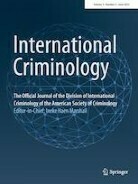Estela Rivero and Tom Hare, Senior Research Associates and Co-Directors of the Central America Research Alliance (CARA), in co-authorship with Salpi S. Kevorkian (Florida International University) and Ryan C. Meldrum (Florida Atlantic University), have recently published a peer-reviewed article titled “Street Code Values Among Youth in the ‘Northern Triangle’ of Central America: Do They Predict Delinquency, Substance Use, and Bullying Perpetration?” in the International Criminology journal published by Springer.

In discussion with Elijah Anderson’s theoretical framework, which argues that youth who hold stronger street code values are more likely to engage in antisocial behavior, the authors propose examining other criminological variables of interest as more robust predictors for engagement of antisocial behavior in youth than adherence to individual-level street code values. The authors seek to fill the gap in scholarship with empirical findings drawn from one of the most violent regions in the world, the “Northern Triangle” region of Central America (El Salvador, Honduras, and Guatemala), drawing on data obtained from the GREAT (Gang Resistance Education and Training) program.
The authors seek to address whether adherence to street code values is generalizable to youth delinquency and violence, whether greater adherence to individual-level street code values impacts non-violent, delinquent outcomes, and whether the effects of greater adherence to individual-level street code values remain relevant when factoring competing criminological variables.
In their discussion, the authors find that the association between street code values and delinquency, substance use, and bullying perpetration is substantially reduced if other theoretical variables, such as low self-control, peer behavior, and school commitment, are included in investigations.
A wider hypothesis is that the relevance and significance of street code values may be culturally specific and vary from country to country.
Article’s full citation:
Kevorkian, S.S., Meldrum, R.C., Rivero Fuentes, M.E. et al. Street Code Values Among Youth in the ‘Northern Triangle’ of Central America: Do They Predict Delinquency, Substance Use, and Bullying Perpetration?. International Criminology (2023). https://doi.org/10.1007/s43576-023-00101-5